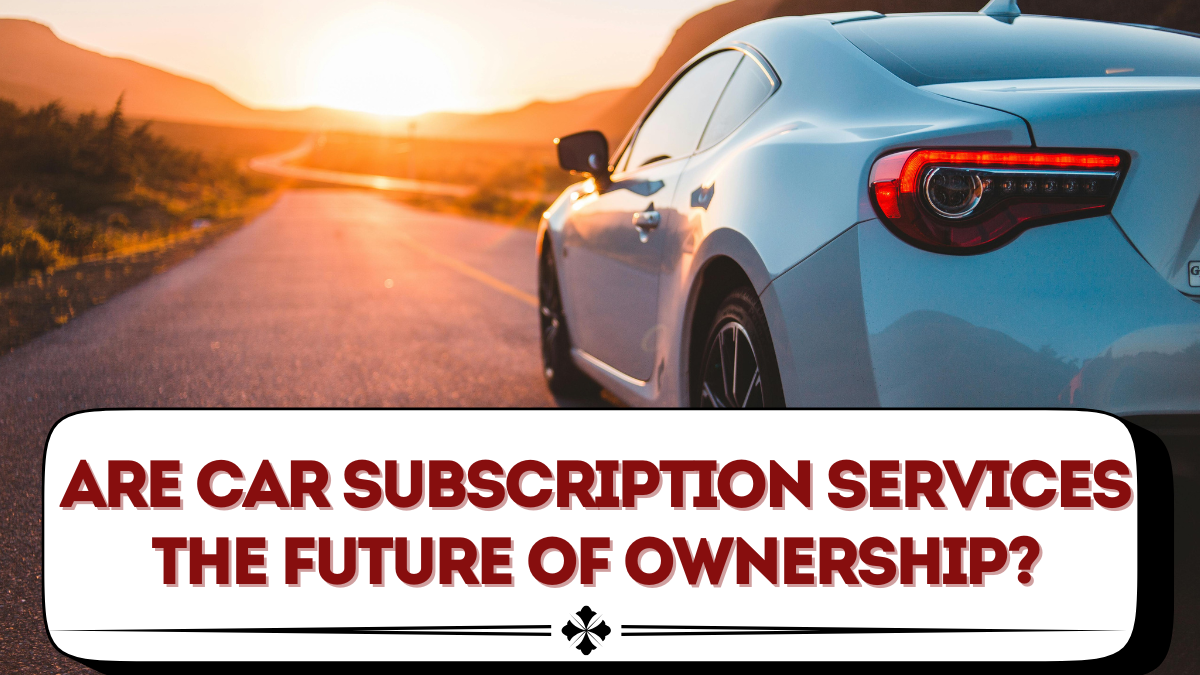For decades, owning a car meant purchasing it outright or committing to long-term loans and leases. But in 2025, a new mobility trend is reshaping the way people think about vehicles—car subscription services. These flexible programs allow drivers to pay a monthly fee for access to a car without the burdens of ownership, maintenance, or resale worries.
With younger generations valuing flexibility, digital platforms, and shared mobility over traditional ownership, car subscriptions are emerging as a strong alternative. But are they truly the future of driving, or just another short-term trend?

What Are Car Subscription Services?
Car subscription services are membership-based programs where drivers pay a recurring monthly fee to use a car. Unlike leasing, subscriptions often include additional benefits like insurance, maintenance, and roadside assistance, making them an all-inclusive option.
In 2025, subscriptions range from basic economy vehicles to luxury models, catering to different budgets and lifestyles.
Key features of car subscription services:
-
Month-to-month or flexible contracts.
-
Insurance and maintenance included.
-
Option to switch vehicles depending on need.
-
Digital-first access via apps and online platforms.
Why Car Subscriptions Are Gaining Popularity
Several factors are driving the adoption of car subscription services:
-
Flexibility – Drivers can change vehicles as often as needed, from a sedan for daily use to an SUV for weekend trips.
-
Convenience – Insurance, servicing, and registration are bundled into one monthly fee.
-
No Long-Term Commitment – Unlike car loans or leases, subscriptions allow easy exits.
-
Appeal to Younger Generations – Millennials and Gen Z prioritize access over ownership.
-
Digital Accessibility – Apps and online platforms make sign-up and management seamless.
Car Subscription vs Leasing vs Buying
| Feature | Subscription | Leasing | Buying |
|---|---|---|---|
| Commitment | Short-term (month-to-month) | 2–3 years | Long-term |
| Insurance | Included | Not included | Not included |
| Maintenance | Included | Sometimes included | Owner’s responsibility |
| Flexibility | High—switch cars | Low—fixed car | None—you own it |
| Resale Value | Not applicable | Not applicable | Dependent on market |
| Upfront Costs | Low | Moderate | High |
This comparison shows why subscriptions appeal to modern drivers who value flexibility and convenience.
Trends in Car Subscription Services for 2025
-
Luxury Car Subscriptions – Premium brands like BMW, Audi, and Mercedes are offering subscription tiers for high-end vehicles.
-
EV Subscriptions – With EV adoption rising, many companies now provide all-electric subscription fleets, including home charging solutions.
-
Corporate Subscriptions – Businesses are offering employees cars under flexible plans instead of traditional company cars.
-
Regional Services – Startups and mobility platforms are launching localized subscription services tailored to city commuters.
-
Pay-Per-Mile Options – Some companies offer pricing based on mileage rather than flat monthly fees.
Benefits of Car Subscription Services
-
Predictable Costs – All-inclusive pricing makes budgeting easier.
-
Access to Variety – Users can try different models before making a long-term choice.
-
No Resale Hassle – Drivers return the car at the end of the subscription.
-
Technology Integration – Many subscriptions include connected car features and app-based support.
-
Environmentally Friendly – Shared subscription fleets reduce the need for every household to own multiple vehicles.
Challenges and Concerns
While promising, car subscriptions are not without issues:
-
Higher Monthly Cost – Subscriptions often cost more per month than leasing.
-
Limited Availability – Services may be restricted to major cities.
-
Vehicle Switching Limits – Some programs cap the number of car swaps per year.
-
Insurance Restrictions – Policies may have strict driver eligibility requirements.
-
Uncertainty of Long-Term Value – It’s unclear if subscriptions will remain competitive as ownership models evolve.
Who Should Consider Car Subscription Services?
Car subscription services are ideal for:
-
Urban Residents – Who don’t want the hassle of parking and maintenance.
-
Frequent Travelers – Who need flexibility to switch between cars.
-
Corporate Users – Companies offering employees flexible mobility perks.
-
EV Curious Drivers – Who want to test electric cars before fully committing.
FAQs
How do car subscription services differ from leasing?
Subscriptions include insurance, maintenance, and shorter commitments, while leasing requires longer contracts and excludes extras.
Are car subscriptions cheaper than buying?
Not necessarily. They may cost more monthly but save money on insurance, servicing, and depreciation.
Can I switch cars in a subscription plan?
Yes, many services allow vehicle swaps, though some limit the number per year.
Do car subscription services cover EVs?
Yes, many now offer electric and hybrid options, often bundled with home charging packages.
Are subscription services available everywhere?
They are more common in urban centers and developed markets, but availability is expanding globally.
Conclusion
Car subscription services are changing the way we think about car ownership. With bundled insurance, maintenance, and flexible contracts, they offer a stress-free alternative to leasing or buying. While costs remain higher than traditional options, the convenience, flexibility, and lifestyle benefits are attracting a growing number of drivers. As automakers and mobility companies expand offerings in 2025, subscriptions may well become a mainstream alternative, especially for younger generations and city dwellers.
Click here to know more.
